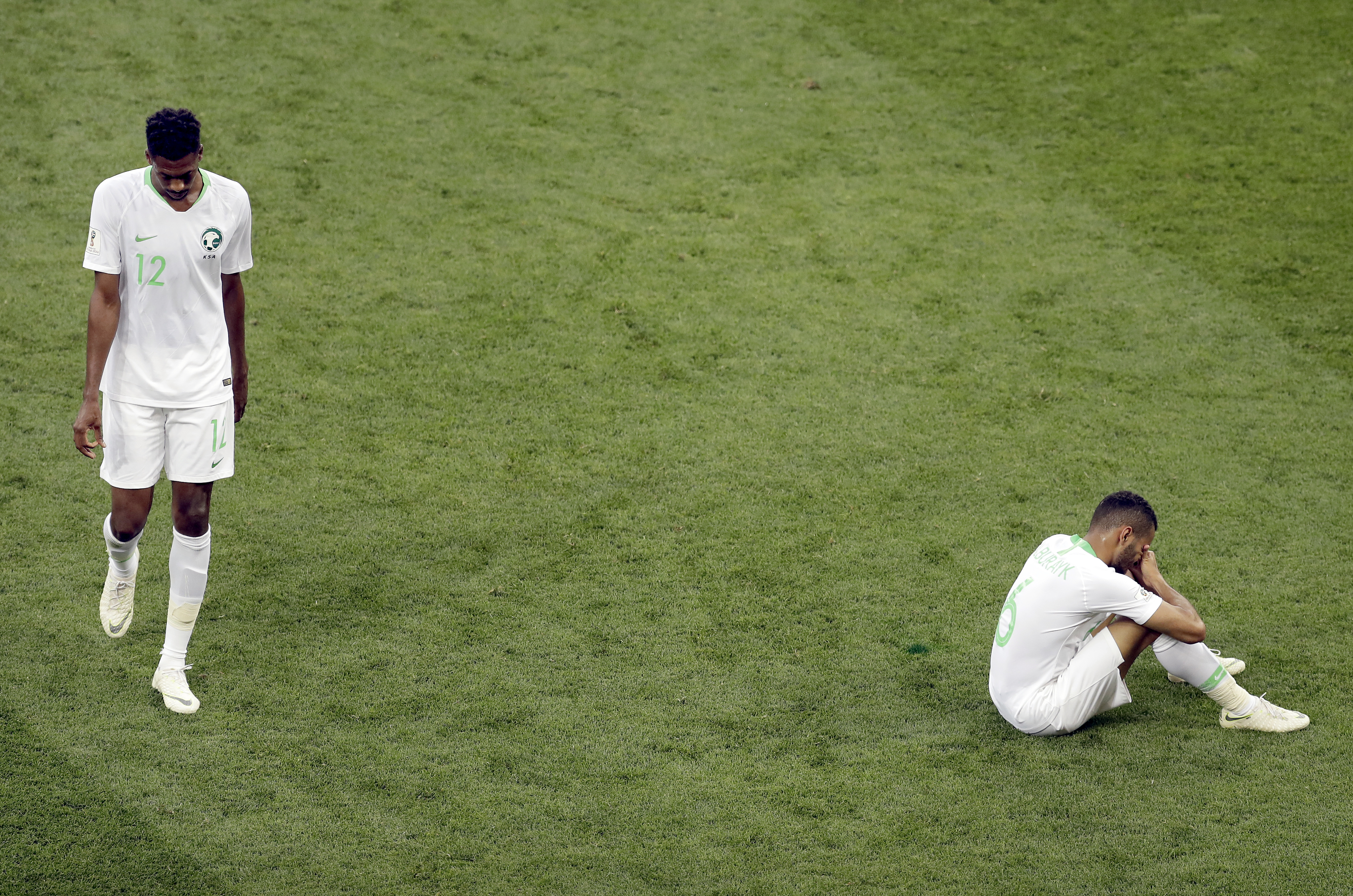
Saudi Arabia’s Mohamed Kanno , left, and Mohammed Alburayk, right, after the group A match between Uruguay and Saudi Arabia at the 2018 soccer World Cup in Rostov Arena in Rostov-on-Don, Russia, Wednesday, June 20, 2018. (AP Photo/Themba Hadebe)
VOLGOGRAD, Russia — In theory, it’s an inconsequential match between two teams already eliminated from the World Cup.
In reality, Monday’s clash between Egypt and Saudi Arabia is about pride, politics and maybe some score settling too.
Fans in the two nations are locked in a public quarrel pitting Saudi Arabia’s top sports official — a maverick and a confidante of the kingdom’s powerful crown prince — against Egypt’s biggest soccer club over the fate of millions he poured into the club’s coffers during his brief tenure as the club’s honorary chairman.
Inappropriate comments by the official, Turki Alsheikh, about Egypt’s Mohamed Salah, fueled the spat, dragging millions of the Liverpool striker’s fans into it and unleashing a flood of abuse and hate speech on social media against him and Saudi Arabia, a close ally of Egypt and one of its chief economic backers.
“May God heal you (Salah) after the World Cup,” Alsheikh told reporters in Moscow on the eve of Saudi Arabia’s 5-0 loss to host Russia in the tournament’s opening match. Salah was injured in last month’s Champions League final. He did not play in Egypt’s 1-0 loss to Uruguay, but started against Russia June 19, scoring from the penalty spot in a 3-1 loss.
In March, Alsheikh tweeted this about Salah; “He must be sidelined before the World Cup,” hoping the 26-year-old Egyptian star would not play against the Saudis Monday.
So outraged were Egyptian fans that some suggested Alsheikh may have paid Sergio Ramos, the Real Madrid defender who took down Salah in the May 26 Champions League final. No foul was called.
The angry allegation reflects the depth of resentment Egyptians feel toward the Saudi official and their affection for Salah.
Alsheikh has not endeared himself to Morocco’s soccer fans either. His country voted this month to support the eventually successful North American bid to organize the 2026 World Cup over Morocco’s bid. The unexpected move drove Moroccan fans to join their Egyptian peers in the spat with the Saudis.
Alsheikh was also involved in testy Twitter exchanges with the president of European soccer over Qatar-owned sports broadcasting rights. Saudi Arabia, Egypt and other nations started a blockade against Qatar last year, accusing the tiny but super rich Gulf nation of supporting opposition Islamist groups and working to destabilize the region. Qatar has rejected the accusations, calling the blockade a politically motivated attempt to undermine its sovereignty.
Alsheikh suggested Thursday that UEFA President Aleksander Ceferin was a man “of many faces,” whom he had refused to meet. Ceferin’s response was that he had never heard of Alsheikh and would not meet with him.
The Saudi-Egyptian quarrel has clear political undertones and the potential to spill over into the pitch when the two meet in Volgograd in their final World Cup match. That potential is all the more ominous because both are keen to make an impression on soccer’s highest stage before they go home.
Soccer matches between Arab teams are often fraught with tension. This is particularly the case between Egypt and Saudi Arabia, said sports analyst Fathy Sanad.
“It’s a special match for both teams. Both want to assert themselves after their exit from the World Cup, but they must make sure that the impression they leave is not negative. They must conduct themselves in a civilized manner and rise above Arab sensitivities.”
Alsheikh heads Saudi Arabia’s General Sports Authority, the country’s highest sports agency, as well as the Saudi Olympic committee and the pan-Arab soccer confederation. A former policeman, he’s known to be close to Saudi Arabia’s powerful heir to the throne, Crown Prince Mohammed bin Salman.
Alsheikh’s dispute with Al-Ahly is rooted in his December appointment as an honorary president of the storied Cairo club. With deep pockets and global soccer connections, he appears to have wasted no time to take his largely ceremonial position way beyond its terms of reference. He secured a flurry of signings by Saudi clubs of surplus or unhappy Al-Ahly players, bankrolled the renewal of contracts for key club players, shopped for a new coach and announced a multi-million dollar project for a new Al-Ahly stadium.
His attempt to wield influence over Al-Ahly, perhaps Egypt’s most popular club in Egypt, drew a sharp reaction from the man who in December bestowed on him the honorary title, former Egypt great Mahmoud el-Khateib.
“No one, no one at all — with all due respect to Turki or no Turki … will be allowed to interfere in the club’s affairs, especially the football team,” el-Khateib, Al-Ahly’s chief executive, announced in televised comments.
Apparently sensing that his honorary title could be withdrawn, Alsheikh stepped down last month and immediately threatened legal action, claiming the Cairo club has mismanaged 260 million Egyptian pounds (nearly $15 million) he has poured into its coffers over a five-month period. He also hired a top Egyptian lawyer, who has threatened legal action against Egyptian social media users and news sites insulting his client.
The Saudi and Egyptian governments have remained silent on the ongoing spat, perhaps out of concern that publicly commenting would make things worse, but it also points to the silent competition between the two regional heavyweights.
“These two nations are zealously competing for regional, political and sports leadership,” said Egyptian political analyst Hassan Nafaa. “It’s a love-hate relationship that is chiefly governed by common interests.”